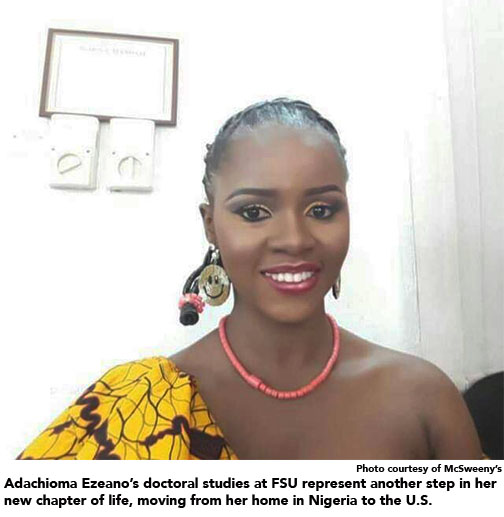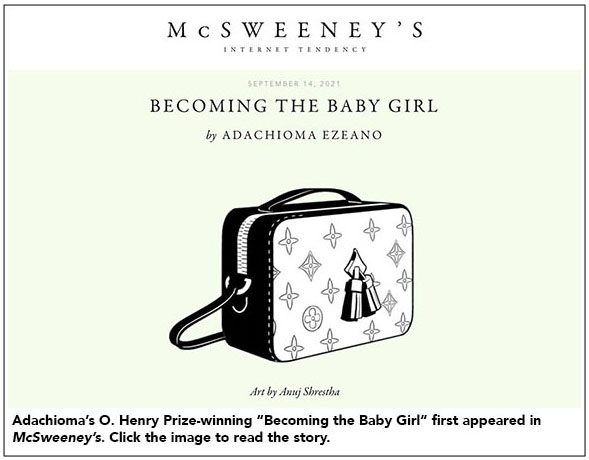Ph.D. student and 2021 O. Henry Prize winner Adachioma Ezeano finds creative, enlightening aspects to writing in any environment
By Olivia Brooks
In the fall of 2022, Adachioma Ezeano began her doctoral studies in Florida State University’s English-Creative Writing Program. In fact, not long ago, she began a new chapter of her life, this one set in the United States.
Ezeano has been an avid writer since a young age, and she always knew she wanted to pursue a creative lifestyle. Those ambitions inspired her to leave her home in Nigeria at the end of 2020 and move to Lexington, Kentucky, where she started her upper educational studies at the University of Kentucky. After earning her Master of Fine Arts in fiction, she moved south to Tallahassee in July of 2022.
“I came in to the United States during the pandemic,” Ezeano says. “It was quiet and free... during that first semester every class was on Zoom, so I didn’t go out much. I stayed indoors and got to do a lot of writing since I had just won the O. Henry Prize.”
Before her move to Tallahassee, Ezeano had already won the 2021 O. Henry Prize for exceptional short fiction writing for “Becoming the Baby Girl.” In her first year as a doctoral candidate at FSU, she received the Best of the Net 2023 fiction award for her short story “Small Girl Landlady,” which is published in Granta and was the site's Top Read of 2022.
“The more you write, the more you get better at it,” Ezeano says.
Recalling her time growing up with a highly literary perspective, Ezeano says that advanced classes in the arts or extracurricular activities were scarce in Nigeria. The lack of academic outlets did not stop her from enhancing and bettering the craft of writing on her own, however.
Ezeano is one of the few women in her immediate family and group of friends to make the leap to the U.S. Her observant eye and light-heartedness are inspirational when she talks about how she adapted to a new atmosphere.
“I have always been a reader aware of American culture,” she adds, which eased her move to the U.S.
Not only is education important for reaching her highest potential in the craft of writing, she says, but also learning from others’ experiences is just as beneficial, if not more, to the learning and writing process.
As such a prolific writer, she seems to let her creative words flow best on the pages, in the comfort of her characters. Even while being interviewed, she becomes more comfortable once the recorder is turned over, hiding the screen and the ticking timer; she clearly thrives in a less restrictive environment.
Although she admits that progress and representation in diversity issues varies from university to university, Ezeano has a bright smile when she says she wants to “drink from the stream of others’ credentials” wherever she is studying.
This is not limited to the professionals surrounding her in academic settings. Ezeano has benefited personally since winning the O. Henry Prize, becoming a part of the team that finds the next great voices in writing.
“I am now a reader for the O. Henry Prize,” she says. “I look out for language... justice... for stories that bring light to the world.”
 Choosing FSU for her Ph.D. program has helped Ezeano see how creatives in the professional writing field work both individually and in group settings, whether it be students they mentor or other faculty members they collaborate with to develop ideas. By observing the English department culture, Ezeano says she is witness to how that hard work leads to big achievements, such as major writing awards and recognition for excellence in teaching.
Choosing FSU for her Ph.D. program has helped Ezeano see how creatives in the professional writing field work both individually and in group settings, whether it be students they mentor or other faculty members they collaborate with to develop ideas. By observing the English department culture, Ezeano says she is witness to how that hard work leads to big achievements, such as major writing awards and recognition for excellence in teaching.
“Most incoming Ph.D. students in Creative Writing have started to publish work in top-notch journals,” says Professor Mark Winegardner, the English department’s Associate Chair, Graduate Studies. “Chioma’s done that, too. But I don’t think we’ve ever had an incoming student who’s already had a story chosen for the O. Henry Prize.”
Ezeano has joined the talented community of Nigerian graduate students the English department has welcomed here in recent years, Winegardner says, including several from Chimamanda Ngozi Adichie’s highly selective Purple Hibiscus Workshop.
“Just getting into that workshop is a huge honor,” says Winegardner. “It’s become an epicenter of the impressive generation of Nigerian writers emerging on the international literary scene.”
Though Winegardner has not yet had Ezeano in class, she’s planning to take his novel-writing workshop this spring. “I’ve been hoping to have a chance to work with her since I read her application,” he says. “I’m definitely looking forward to it.”
As a graduate student, Ezeano also teaches courses at FSU, and she wants to pass down her understanding of the hard work she sees in the department to her students. The students who take her classes are brilliant, funny, and know what they want to do with themselves, she says, which Ezeano admires.
When she is not working on her own stories or teaching, Ezeano comfortably voices her own truths and passions and engages in conversation about complex and important topics. In February of 2023, she took part in a Black History Month panel to discuss “Black Voices in Writing.” Joining her were Gbenga Adesina, who also is a doctoral candidate in FSU’s Creative Writing Program, and two Florida A&M University faculty members, Journalism and Graphic Communication Associate Professor Bettye Grable and English & Modern Languages Assistant Professor of Kendra Mitchell, who earned both her master's (2012) degree and doctorate (2016) in English-Rhetoric and Composition Studies from FSU.
“You could tell Adachioma was very passionate about everything she stated during her time on the panel,” says English undergraduate major Destany Lewis, who organized the event. “She is very knowledgeable but also holds room for growth as an individual. You could tell she was not only positively contributing to the conversation but also absorbing the information of her peers.”
That introspective quality Ezeano brought to Tallahassee has led to new discoveries of what post-graduation plans could be in store for her. She knows she wants to be a fiction writer for the entirety of her life, and she enthusiastically gives recommendations of Nigerian authors and writers who inspire her on the daily.
Eventually, however, Ezeano wants to return home to be with her large family and lifelong friends. She was born in Onitsha, Nigeria, and in 2003 her family moved to a small university town, Awka, the capital of Anambra State. The population of Onitsha has more than doubled in size since 2003, from about 617,000 to 1.6 million today.
“In Onitsha, life was fast, noisy, very noisy,” Ezeano said in a 2019 interview for Electric Literature in an article titled "Meet the Most Promising New Voices of Nigerian Fiction." “It was in Onitsha that I saw what it meant to experience armed robbers in broad daylight: muscled men shooting their guns loudly, citizens, aka the victims, running for shelter while the police flew from the crime scenes. In Onitsha, humans were burned alive for stealing something trivial like underwear.
“It was in Onitsha that I learned what it meant to have neighbors who genuinely called you neighbors, strangers who would become family simply because you preferred to pay for the apartment next to theirs.”
In comparison, living in Awka was much different.
“In Awka, life was simple,” Ezeano says. The 2022 population estimate for Awka was 270,300 people. “My father worked in a mortgage bank, and my mother taught in a state government-owned primary school. We lived near university lecturers and civil servants and public servants, people who read. And life was like the early morning breeze; soft, uncorrupt.”
Being in the U.S., at the University of Kentucky and at FSU has helped Ezeano see the potential for what she can achieve, but also what other Nigerians should be able to achieve. Within the next five years, she wants to move back home and begin funding in her community to build a school for students to have a creative space to find their passion for arts.
Ezeano explains that embracing arts and crafts is essential to her lifestyle of writing. She believes that environment aids the ability to absorb the constant evolution of cultural shifts going on around her.
“The schools I went to in Nigeria didn’t have space for arts and creativity. . .and you need that,” she says. “You need to be creative to see the world from a different perspective.”
The schools I went to in Nigeria didn’t have space for arts and creativity. . .and you need that. You need to be creative to see the world from a different perspective.
— Adachioma Ezeano
Even so, Ezeano says the transition from living in Nigeria to the U.S. was not as overwhelming as she expected it to be, thanks to her literary background. As she talks about that foundation, Ezeano discusses how a person can grasp an understanding of different lifestyles and cultures through the pages of books. Becoming aware of those differences through reading can be an intricate process, but she emphasizes the importance of people seeing and learning with their own eyes the world around them to gain new perspectives.
With her own credibility on the topic gained first-hand in Kentucky and at FSU, Ezeano truly believes she can create passionate change in her Nigerian community. Her time spent in the U.S. will always be with her, she knows, but she will continue to carry what writing means to her beyond the exposure to cultural and social differences.
“I get to be the god of my characters,” she says.
Ezeano has always written from the heart, she explains, creating outstanding, award-winning stories, but she now has a literary agent to help get these works of art to readers to enjoy. Her agent assists Ezeano by encouraging current writing projects, providing outreach and promotion for already completed pieces, and navigating the writing industry.
Constantly working toward writing and producing new pieces as often as possible, Ezeano has publications in an array of literary magazines, including Granta, Guernica, and McSweeney’s Quarterly. Her work also appears in the anthologies Best Small Fictions and The Best Short Stories. Currently, she is writing a novel as well as a story collection.
The creative, enlightening aspect to writing is one that she holds close to her heart. No matter the life situation, moving from one country to another or studying at different universities, Ezeano always has her portal consisting of pen and paper to take her anywhere she wants to go.
Ezeano expresses a special appreciation for the freedom that fiction writing gives her, and FSU’s Creative Writing Program has given her hope and aspirations for future creative endeavors. Ultimately, she wants to create comforting spaces for students of any age to engage in their creative side and to seek the freedom she has found.
“When I write, I glow,” Ezeano says.
Even in a short conversation about the story of her life, the glow is present, and certainly will remain strong as long as she can write to fuel her soul.
Olivia Brooks is an English major on the editing, writing, and media track, with a minor in communication.
Follow the English department on Instagram; on Facebook; and on X.
